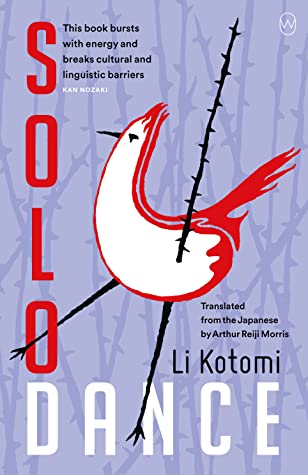Book Review: Solo Dance by Li Kotomi, translated by Arthur Reiji Morris
Summary:
Cho Norie, twenty-seven and originally from Taiwan, is working an office job in Tokyo. While her colleagues worry about the economy, life-insurance policies, marriage, and children, she is forced to keep her unconventional life hidden—including her sexuality and the violent attack that prompted her move to Japan. There is also her unusual fascination with death: she knows from personal experience how devastating death can be, but for her it is also creative fuel. Solo Dance depicts the painful coming of age of a queer person in Taiwan and corporate Japan. This striking debut is an intimate and powerful account of a search for hope after trauma.
Review:
This is a gut-wrenchingly beautiful read that I couldn’t put down.
The story starts with Cho in Japan. We learn what led to her emigration from Taiwan through a combination of flashbacks and her rereading her own college journal entries. Cho is a writer who has been obsessed with death from a young age. But she also went through a devastating trauma. The PTSD from that event destroyed her budding relationship with another young woman and haunts her to this day.
I think it’s important for anyone considering this book to know coming into it what the devastating trauma was. It’s central to the book and can be quite triggering for some. Cho was raped by a stranger who specifically targeted her due to her same-sex relationship. Although Cho does encounter kind and understanding people who validate how wounded she is from this experience, there are others who expect her to just get over it. Worse, some people blame her for it. She feels shame for what has happened to her. While this is realistic, it is painful to read about.
So this book is about many complex things. It’s about how Cho was obsessed with death from a young age. Why is that? Is it ok to feel that kind of emo way? It’s also about the systemic exclusion of queer and trans people. Cho also travels the world and sees how queerness and Pride and love exist in many countries. While she wants a sense of belonging, just what is the right way to belong is a question left for the reader. Ultimately, though, this is a book about trauma and healing from trauma. How trauma isolates a person, even when other people try, imperfectly, to reach out.
It’s easy as a queer westerner to get caught up in what queerness means in the west. It’s important to dive into what queerness means and looks like in other cultures in order to better grasp how we might create a community that’s more inclusive of all types of origins and experiences.
Although this novella is challenging, it’s also beautiful. If you feel ready to engage with the realistic trauma depicted in it, I encourage you to pick up a copy.
If you found this review helpful, please consider tipping me on ko-fi, checking out my digital items available in my ko-fi shop, buying one of my publications, or using one of my referral/coupon codes. Thank you for your support!
4 out of 5 stars
Length: 149 pages – novella
Source: NetGalley
Buy It (Amazon. This book is not available yet on Bookshop.org)
Get the Reading Group / Book Club Discussion Guide
A beautifully graphic designed 2 page PDF that contains: 1 icebreaker, 9 discussion questions arranged from least to most challenging, 1 wrap-up question, and 3 read-a-like book suggestions
View a list of all my Discussion Guides.



